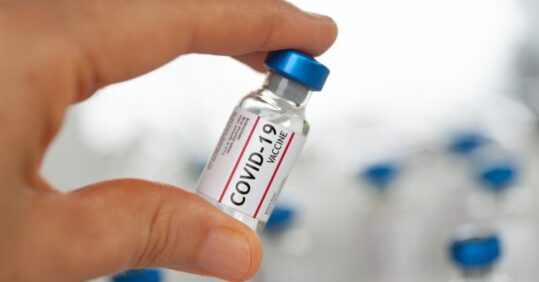This seems to support the UK’s delay of the second dose to 12 weeks, the researchers claimed.
However, it remains unclear how long immunity lasts beyond 21 days without a second jab.
Official guidance changed on 31 December to say all second vaccine doses should be given after 12 weeks instead of three weeks to maximise the number of people protected against Covid-19 in the shortest possible timeframe.
Some practices had decided to honour second-dose appointments already made but NHS England later said this was banned.
Now a University of East Anglia (UEA) study, which is not yet peer-reviewed, has re-analysed data from the Pfizer vaccine’s rollout in Israel to estimate its effectiveness over time.
It found that a single dose provided ‘very high’ protection of 90% against the virus after 21 days, without a second dose within the 21 days recommended by the manufacturer, according to the pre-print paper.
Lead researcher and Covid-19 expert Professor Paul Hunter said this ‘supports the UK policy of extending the gap between doses by showing that a single dose can give a high level of protection’.
He added: ‘Whilst we do not know how long this immunity will last beyond 21 days without a second booster, we are unlikely to see any major decline during the following nine weeks.’
Professor Hunter told Nursing in Practice sister title Pulse that although we can’t be ‘certain’ that immunity will not decline between 21 days and 12 weeks, immunity levels ‘don’t decrease that quickly for anything’.
He said: ‘We don’t know for certain that that will last for a very long time but with all the other information that we have about natural infection with Covid, the Oxford/AstraZeneca vaccine and vaccinations to pretty much every other viral disease that you could wish to name, [we think] that’s going to last at least six months with that sort of level and certainly it’ll last well enough to your second dose.
‘There’s been a lot of criticism of the increased gap, but very little of that criticism has come from people who work in infectious diseases.’
He added in a UEA press release that there were ‘a number of flaws’ in a recent paper based on the Israeli data – also not peer-reviewed – which reported that a single dose of the Pfizer vaccine may not provide adequate protection.
He said: ‘They did not attempt to estimate the effectiveness of the vaccine from day 18 onwards. This would have given a better indication of how effective a single dose of the vaccine could be if the second dose was delayed by up to 12 weeks.’
The new UEA study showed that the risk of infection ‘doubled’ in the first eight days after vaccination, but then declined to low levels by day 21.
Professor Hunter suggested the initial increase may be because people become ‘less cautious’ after receiving the vaccine.
He added: ‘We found that the vaccine effectiveness was still pretty much zero until about 14 days after people were vaccinated.
‘But then after day 14, immunity rose gradually day by day to about 90% at day 21 and then didn’t improve any further. All the observed improvement was before any second injection.’
Dr Peter English, consultant in Communicable Disease Control, former editor of Vaccines in Practice Magazine and former BMA Public Health Medicine Committee chair, said the study does ‘not provide any direct evidence’ that a single dose will be effective for up to 12 weeks.
He said: ‘The preprint (and the source data it relies on) do not provide any direct evidence that the efficacy of a single dose of vaccine will continue up until 12 weeks.
‘[However,] they do support the efficacy of a single dose of vaccine, show that it takes about three weeks for the full benefits to accrue, and the lack of any sign of diminution of efficacy up until 24 days is reassuring.’
The conclusion that effectiveness rose from near zero at day 14 to around 90% at day 21 ‘before levelling off is ‘robust and useful’, he added.
It comes as another study has suggested that the Oxford vaccine also shows ‘sustained protection’ of 76% during the 12 weeks between doses







